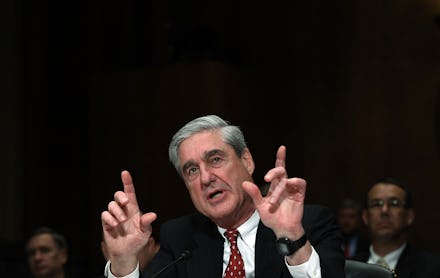Robert Mueller has impaneled a grand jury in the Russia probe. Here’s why that’s important.

Special counsel Robert Mueller has impaneled a grand jury as part of his probe into the Trump campaign’s alleged ties to Russia, the Wall Street Journal reported Thursday, a clear sign the investigation is heating up and could continue to drag on for months.
The fact Mueller impaneled a grand jury doesn’t mean one or more indictments are imminent, but it does provide some clues about where the investigation stands.
For one, a grand jury had already been convened for former national security adviser Mike Flynn, who resigned in February after misleading White House officials about his contacts with Russians during the campaign.
“If there was already a grand jury in Alexandria looking at Flynn, there would be no need to reinvent the wheel for the same guy,” Stephen I. Vladeck, a law professor at the University of Texas, told the WSJ. “This suggests that the investigation is bigger and wider than Flynn, perhaps substantially so.”
Impaneling a new grand jury also provides Mueller with another investigative tool as he seeks to get to the bottom of whether Trump campaign officials colluded with the Russians — who, per U.S. intelligence officials, orchestrated cyberattacks against Democratic institutions to try and influence the 2016 presidential election.
Here’s how:
A federal grand jury is a group of 23 citizens who meet in secret to hear testimony and examine documents presented to the group by federal prosecutors. Said prosecutors can subpoena witnesses and/or documents to put before the grand jury, legally compelling those individuals to either produce said documents or testify under oath.
In this case, Mueller’s impaneling of a grand jury suggests he thinks there is enough evidence to release subpoenas in the first place. In fact, according to Reuters, the grand jury has already issued subpoenas related to the meeting Donald Trump Jr. had with Russian lawyers in June 2016.
A grand jury also carries legal risk for those who receive subpoenas, as failing to produce documents after receiving a subpoena could lead to contempt charges and lying during grand jury testimony could lead to perjury charges.
If Mueller thinks there’s ultimately enough evidence to indict, he will then seek indictments from the grand jury panel.
Everything that happens before a grand jury is confidential, and grand jurors can be prosecuted if they leak information that comes before them. That means it’s unlikely the public will hear what goes on in the room.
Trump’s lawyer, Ty Cobb, told the WSJ he was unaware a new grand jury had been convened.
But he added that the White House will “fully cooperate.”
“The White House favors anything that accelerates the conclusion of his work fairly,” Cobb told the WSJ.